Dive into the intriguing post-Shark Tank journey of Ninja Cards, the innovative card-throwing game introduced by Ken Haton and Dustin Berk. Beyond the confines of the tank’s scrutiny, Ninja Cards embarked on a unique trajectory, blending traditional martial arts with modern gaming elements.
Explore the aftermath of their Shark Tank appearance, assessing the current status of the business, its profitability, and the impact it has made in the dynamic realms of entertainment and fitness. Uncover the challenges faced, the benefits offered, and the evolving identity of Ninja Cards in the ever-shifting landscape of entrepreneurial ventures.
What Is Ninja Cards:
The idea behind Ninja Cards is innovative and exciting, particularly for those fascinated by the ninja culture. It adds an element of novelty and adrenaline rush that is often missing in traditional board games.

Pros:
- Versatility in Training: Ninja Cards promise to be more than just a quirky set of playing cards. Each card is embedded with QR codes that, when scanned with a dedicated mobile app, unlock a variety of instructional videos demonstrating ninja techniques. From stealthy moves to self-defense tactics, the cards aim to be a versatile tool for martial arts enthusiasts and beginners alike;
- Progressive Learning Structure: The instructional videos provided by Ninja Cards are thoughtfully structured, catering to users with varying skill levels. Whether you are a complete novice or an experienced martial artist, the progressive learning approach ensures a smooth transition from basic to advanced techniques, creating an engaging and comprehensive learning experience;
- Interactive Learning Experience: The integration of technology through QR codes and the mobile app adds an interactive layer to the learning process. Users can practice moves, receive instant feedback, and track their progress over time. This feature not only enhances engagement but also fosters a sense of achievement, motivating users to continue their ninja training journey;
- Compact and Portable: One of the standout features of Ninja Cards is their compact design. Comparable in size to standard playing cards, they can easily fit into a pocket or purse, allowing users to carry their ninja training tool wherever they go. This portability enhances the accessibility of the product, making it suitable for impromptu training sessions or on-the-go practice;
- Aesthetic Appeal: Ninja Cards strike a balance between modern aesthetics and traditional ninja imagery. The sleek, matte finish and minimalist design of the cards contribute to their visual appeal. The incorporation of iconic ninja symbols and illustrations adds a touch of authenticity, creating a product that is not only functional but also visually enticing;
- Durable Construction: Recognizing the physical demands of martial arts training, Ninja Cards are constructed with durability in mind. The use of high-quality materials ensures that the cards can withstand repeated use and potential wear and tear. This durability is crucial for a product intended to be a long-term training companion;
- Compact Storage Case: The inclusion of a compact storage case adds to the overall convenience of Ninja Cards. The case not only protects the cards from damage but also contributes to their portability. The thoughtful design of the case, with compartments for different skill levels, enhances organization and accessibility during training sessions;
- Niche Appeal: Ninja Cards cater to a niche market of martial arts enthusiasts, offering a unique blend of tradition and technology. This niche appeal can be a strength, as it allows the product to target a specific audience passionate about martial arts and ninja culture;
- Educational Value: Beyond the martial arts community, Ninja Cards also have educational potential. Schools, fitness centers, and youth organizations could adopt the product as a creative and engaging way to introduce physical activity and self-defense skills to a broader audience;
- Engaging and Fun Learning: Ninja Cards successfully inject an element of fun into the learning process. The gamified approach, with the use of cards and a mobile app, transforms the training experience into an engaging activity. This not only attracts users but also contributes to long-term retention and commitment to training;
- Innovative Integration of Technology: The seamless integration of technology into a traditional training tool is a testament to the innovation behind Ninja Cards. The product effectively harnesses the power of mobile apps and QR codes to enhance the learning experience, providing a modern twist to traditional martial arts training [2];
Cons:
- Dependence on Technology: While the integration of technology is a key selling point, it also presents a potential drawback. Users who prefer traditional training methods may find the reliance on a mobile app cumbersome. Additionally, technical glitches or app malfunctions could disrupt the learning experience, highlighting the importance of a reliable and user-friendly platform;
- Limited Depth in Techniques: Despite the progressive learning structure, some users may find the range of techniques covered by Ninja Cards somewhat limited. The emphasis on portability may have led to a compromise in the depth of content, leaving advanced practitioners desiring more intricate and nuanced ninja techniques;
- Potential for Wear: While the durability of Ninja Cards is commendable, the repeated use of certain cards may lead to wear over time. This is particularly true for cards that demonstrate high-impact techniques. The long-term resilience of the cards will depend on the quality of materials used, and users may need to replace cards periodically to maintain an optimal training experience;
- Limited Customization Options: The standardized design of Ninja Cards, while visually appealing, may leave some users desiring a more personalized touch. The lack of customization options, such as the ability to choose card colors or add personalized symbols, may hinder the product’s appeal to individuals seeking a unique and personalized training tool;
- Limited Mass Appeal: The niche nature of Ninja Cards could also be a potential limitation. The challenge lies in expanding beyond the core market of martial arts enthusiasts and convincing a broader audience of the product’s value. Mass adoption may be hindered by the perception that Ninja Cards are exclusively for those with a specific interest in martial arts;
- Market Saturation: The market for fitness and training products is highly competitive, with a myriad of options available. Ninja Cards must contend with established brands and innovative newcomers, making it crucial for the product to distinguish itself and effectively communicate its unique value proposition;
- Balancing Tradition and Innovation: While the integration of technology is innovative, there is a delicate balance to maintain between tradition and modernity. Some purists within the martial arts community may view the inclusion of mobile apps as a departure from the authenticity of traditional training methods. Striking the right balance will be crucial for Ninja Cards to gain acceptance across diverse user groups;
- Communication of Value Proposition: The challenge for Ninja Cards lies not only in delivering a valuable product but also in effectively communicating its unique value proposition to potential users. Clear marketing strategies and educational campaigns will be essential to convey the benefits of Ninja Cards and differentiate them from other training tools in the market;

Who May Benefit From Using?
Martial Arts Enthusiasts:
- Novices: Beginners in martial arts who are looking for an interactive and engaging way to learn fundamental techniques and self-defense moves can benefit from Ninja Cards. The progressive learning structure caters to those who are new to martial arts, providing a structured pathway for skill development;
- Intermediate Practitioners: Individuals with some martial arts experience can use Ninja Cards to enhance their skills and explore a variety of techniques. The convenience of portability allows for spontaneous practice sessions, helping intermediate practitioners refine their techniques outside of formal training environments;
- Advanced Martial Artists: While the range of techniques may be somewhat limited, advanced martial artists may still find value in the portability and durability of Ninja Cards. They can serve as a supplementary tool for quick reviews or as a creative way to introduce new techniques to their training regimen [3];
Fitness Enthusiasts:
- General Fitness Seekers: Individuals who are not necessarily martial arts enthusiasts but are looking for a fun and active way to incorporate physical activity into their routine may find Ninja Cards appealing. The gamified approach can turn training into an enjoyable experience, motivating users to stay consistent with their fitness goals;
- Youth and Educational Settings: Physical education programs in schools or youth organizations may benefit from incorporating Ninja Cards as a creative and interactive tool to introduce basic self-defense moves and fitness activities. The educational value of the product can make it an engaging addition to fitness curricula;
Technology-Inclined Learners:
- Tech-Savvy Individuals: Those who enjoy leveraging technology for learning and self-improvement will appreciate the integration of QR codes and the mobile app with Ninja Cards. The interactive learning experience adds a modern touch to traditional training methods, making it particularly appealing to individuals comfortable with digital platforms
- Remote Learning Enthusiasts: With the ability to access instructional videos through the mobile app, individuals who prefer or are constrained by remote learning environments can benefit from the convenience of Ninja Cards. This feature allows users to practice at their own pace, anytime and anywhere;
Self-Defense Enthusiasts:
- Personal Safety Advocates: Individuals who prioritize personal safety and self-defense may find Ninja Cards to be a practical tool for learning basic techniques. The compact design allows for easy carrying, making it a convenient accessory for those who want to enhance their self-defense skills on the go;
- Community Safety Initiatives: Neighborhood watch groups or community safety programs could utilize Ninja Cards as a creative and accessible way to introduce self-defense concepts to community members. The product’s educational value makes it suitable for promoting safety awareness in a community setting;
Innovators and Collectors:
- Collectors of Unique Training Tools: Collectors interested in acquiring unique and innovative training tools may be drawn to the novelty of Ninja Cards. The combination of traditional martial arts imagery with modern technology could make it an appealing addition to collections focused on fitness and training gadgets;
- Innovators and Early Adopters: Individuals who are drawn to cutting-edge products and enjoy being early adopters of new technologies may see Ninja Cards as a novel and exciting addition to their collection of fitness and training tools;
About Founders Of Ninja Cards
As this impromptu activity evolved, Dustin conceived the idea of a customized board featuring different value targets, laying the groundwork for the Ninja Card game. Drawing inspiration from Ken’s passion for mixed martial arts, they designed cards with a Ninja theme and commenced painting foam boards in their respective workshops.

Transforming their newfound pastime into a social activity, Ken and Dustin hosted Ninja Card parties for friends. Much to their surprise and delight, these gatherings proved to be immensely popular, often extending late into the night and sometimes stretching into the following day. Recognizing a promising business opportunity, the entrepreneurial duo established the Ninja Card company and began refining their original and unconventional concept.
Expanding their repertoire of customized cards and experimenting with different boards, they fine-tuned the rules of various games. The objective was to create experiences that were fast-paced, enjoyable, easy to grasp, yet challenging to master. Once satisfied with the product, they initiated promotional efforts. During a pivotal moment at the Chicago Toy Fair, they secured an exclusive licensing deal with a major toy company within the first hour, marking a promising start for their venture.
However, the initial success took an unfortunate turn when the toy company, with which they had a licensing agreement, unexpectedly withdrew from the deal. Undeterred, the entrepreneurs persisted in promoting their game for two more years. In October 2014, faced with financial challenges, they sought additional funding and appeared on the popular show Shark Tank, hoping to secure support for their innovative venture.
The Pitch Of Ninja Cards At Shark Tank
Ken Haton and Dustin Berk, the dynamic duo behind the creation of an eccentric and entertaining game, made a Shark Tank entrance as remarkable as their invention. Draped in black from head to toe, the two stealthy Ninjas glided into the room, exuding an air of silent lethality. While their Ninja personas may have been slightly less fearsome than the traditional image, their dramatic entrance still captivated attention. Incorporating a few forward rolls into their approach, they eventually stood before the sharks, revealing their faces [5].
Dustin, adopting the moniker “Dustin The Red Dragon”, and Ken, claiming to be known as “Ken The Butcher”, although the source of this title remained unclear, declared their quest for a $ 60,000 investment in exchange for a 30% stake in their business.
Ken initiated the pitch by delving into the enigmatic world of ninjas, highlighting their extraordinary abilities, strict moral codes, and enviable attributes. Concluding the pitch with the assurance that anyone could become a ninja, Dustin unveiled a sizable custom Ninja Card game board. The entrepreneurs swiftly showcased their super-fast ninja card-throwing skills, leaving the sharks impressed.
The sharks, emitting appreciative noises, witnessed Dustin elaborating on the game’s basics. Drawing parallels with darts, he explained that customers could engage in various games designed by the duo or invent their own. The possibilities, he asserted, were boundless, emphasizing that the true appreciation of the game could only be attained through firsthand experience.
Dustin proposed a friendly competition, inviting two sharks to engage in a Ninja Card battle. Robert Herjavec eagerly volunteered, prompting Daymond and Kevin to vie for the opportunity. Kevin, displaying a surprising and accurate side-throwing technique, emerged as the victor. The tournament, though competitive, showcased the game’s fun and engaging nature, with both participants thoroughly enjoying the experience.
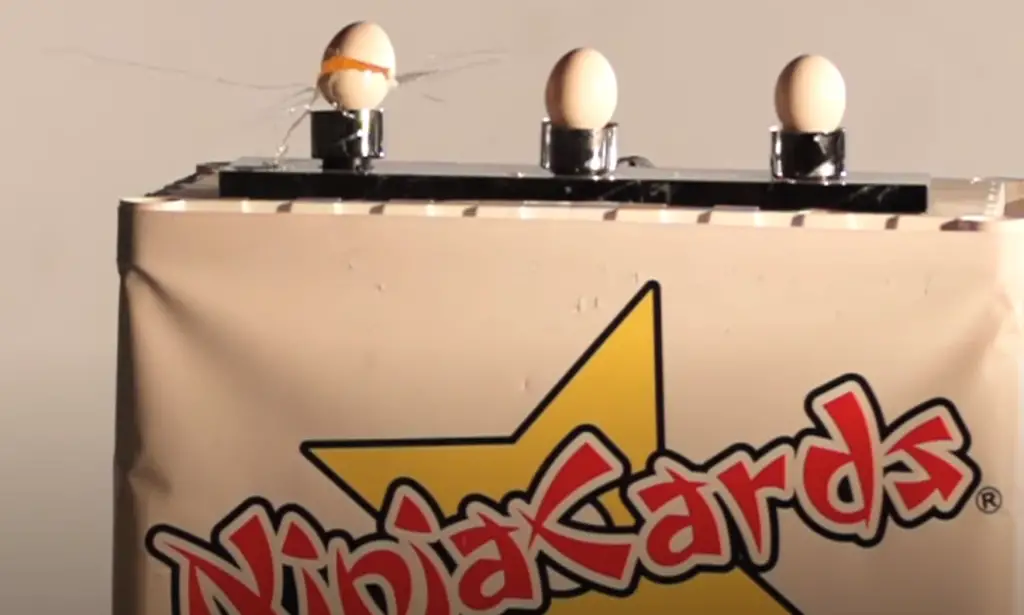
Lori inquired about the cards, questioning whether they were standard playing cards. Dustin confirmed their similarity, noting a slight increase in thickness. Further questions about the board revealed it was crafted from thick Styrofoam, providing insight into the materials used.
Robert, always keen on the business aspect, inquired about the sales. Dustin revealed that they initially produced 100 units, all of which sold out. The revelation prompted a brief moment of silence among the sharks.
Mark Cuban, seemingly amused, sarcastically commented on the 100-unit sales figure. Robert questioned the timeframe in which these units were sold, leading Dustin to explain the challenges following an initial licensing agreement. The deal fell through due to the toy company’s struggles in sourcing materials for the boards.
The sharks, perplexed by the simplicity of the material, expressed disbelief. Dustin, initially claiming it was Styrofoam, later referred to it as “special craft foam”, revealing limited details about the material.
Kevin clarified that the rights to the game reverted to them after the failed licensing agreement. Mark Cuban inquired about the timeline of regaining the rights, learning that it occurred late the previous year. Dustin struggled to articulate their activities during this period, revealing a lack of substantial progress.
Robert asked whether they attempted to secure a new licensing deal. Dustin admitted they hadn’t, citing a lack of connections in the toy industry.
Lori emphasized the importance of networking at toy fairs and conventions, expressing disappointment in their limited efforts. Dustin, appearing hesitant, acknowledged that the product never reached full production beyond the initial few hundred units.
Mark Cuban, unconvinced by their efforts, declared he was not interested in the Ninja Card business but humorously proclaimed himself a “disciple of the Ninja Way”. Robert criticized the duo for lacking hustle, opting out of the negotiation.
Lori, despite liking the game idea, echoed Robert’s sentiments, expressing dismay at their inactivity. She, too, dropped out of the potential deal.
Daymond, lacking interest in the toy market, opted out as well, leaving Kevin O’Leary as the sole remaining shark. Kevin, typically straightforward, suggested that Ken and Dustin throw a metaphorical poison dart into their game board “Behind the Dojo”. With a clear indication that he was also out, the Ninja Card entrepreneurs left the shark tank without securing a deal.
Ninja Cards After The Shark Tank
Ken and Dustin engaged in a discussion following their appearance in the shark tank, elucidating that they hadn’t vigorously pursued an alternative licensing agreement as fervently as the sharks believed was necessary. This decision was primarily influenced by their aspirations for further refinement in the product’s design. They firmly believed that enhancements could be made before resuming the manufacturing process.
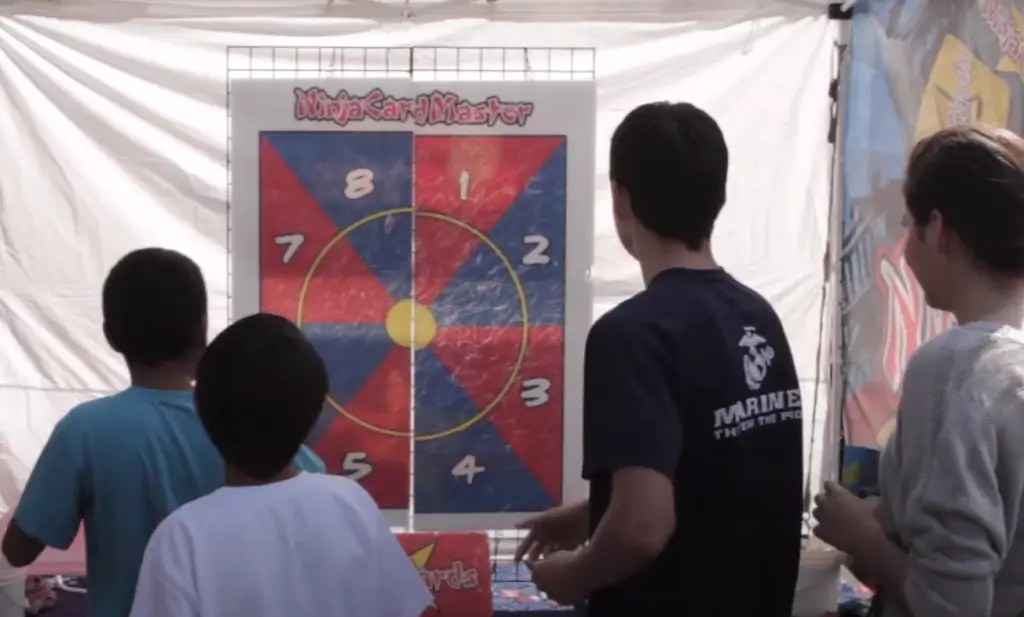
Although the pitch to the sharks did not hit the mark, the Ninja Card Company, led by Ken Haton and Dustin Berk, may not have missed out on a widely popular and lucrative opportunity [6]. The enthusiasm displayed by the entrepreneurial pair for their inventive card-throwing game, conceived solely to alleviate boredom, appears to be shared by a substantial audience. Regardless of their ninja authenticity, Ken and Dustin might see substantial success with their distinctive and pioneering game.
Post-Shark Tank, Dustin, and Ken promptly embarked on realizing their vision for the game. They aimed to create an indestructible game that would provide hours of joy for both children and adults. However, this new iteration posed significant challenges, including the complexities of sourcing materials and engineering. Nevertheless, after overcoming these obstacles, version 2.0 is now ready for launch.
The Net Worth Of Ninja Cards
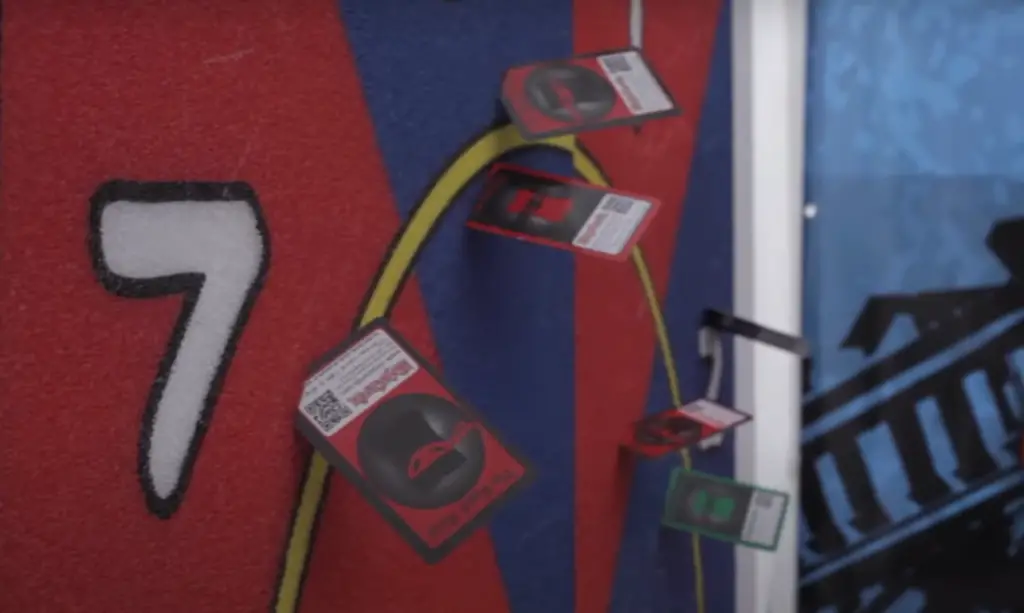
As for the net worth of Tyler “Ninja” Blevins, a popular figure in the gaming industry unrelated to Ninja Cards, it was estimated to be $ 40 million as of March 2023.
Alternatives To Ninja Cards:
Traditional Martial Arts Training:
- Pros: Formal training in a martial arts studio with an experienced instructor provides a comprehensive and personalized learning experience. It allows for real-time feedback and correction of techniques. Traditional training emphasizes discipline, physical fitness, and the development of a deep understanding of martial arts principles;
- Cons: This option may require a consistent schedule and commitment to attending classes. It may not be as flexible or portable as Ninja Cards, and the learning pace could vary depending on the individual’s progress [8];
Online Martial Arts Courses:
- Pros: Numerous online platforms offer martial arts courses with instructional videos, tutorials, and virtual training sessions. Users can learn at their own pace, access a variety of styles, and often interact with instructors and fellow learners. Online courses provide flexibility and convenience for those with busy schedules
- Cons: Lack of in-person feedback and correction can be a drawback. The absence of a physical training partner may limit the practical application of techniques, and the learning experience may not be as engaging as in-person training;
Martial Arts Books and DVDs:
- Pros: Books and DVDs on martial arts provide a wealth of knowledge, often with detailed explanations and visual demonstrations. Users can learn and practice at their own convenience, and these resources are generally cost-effective;
- Cons: The static nature of books and DVDs may limit the interactive and dynamic learning experience. Users might miss out on real-time feedback and correction, and the learning process could be less engaging compared to interactive methods;
Martial Arts Apps:
- Pros: Dedicated martial arts apps offer a variety of instructional content, ranging from basic techniques to advanced forms. These apps often include interactive features, progress tracking, and virtual coaching. Users can learn on the go and tailor their training based on skill level;
- Cons: The effectiveness of martial arts apps may depend on the quality of the content and the user’s ability to stay motivated without in-person guidance. Some apps may require a subscription fee;
Physical Training Equipment:
- Pros: Equipment such as punching bags, focus mitts, and resistance bands can complement martial arts training by providing a physical workout and allowing users to practice specific techniques. These tools enhance strength, speed, and conditioning;
- Cons: The use of physical training equipment may require additional space and investment. While effective for certain aspects of training, it may not cover the full spectrum of martial arts techniques;
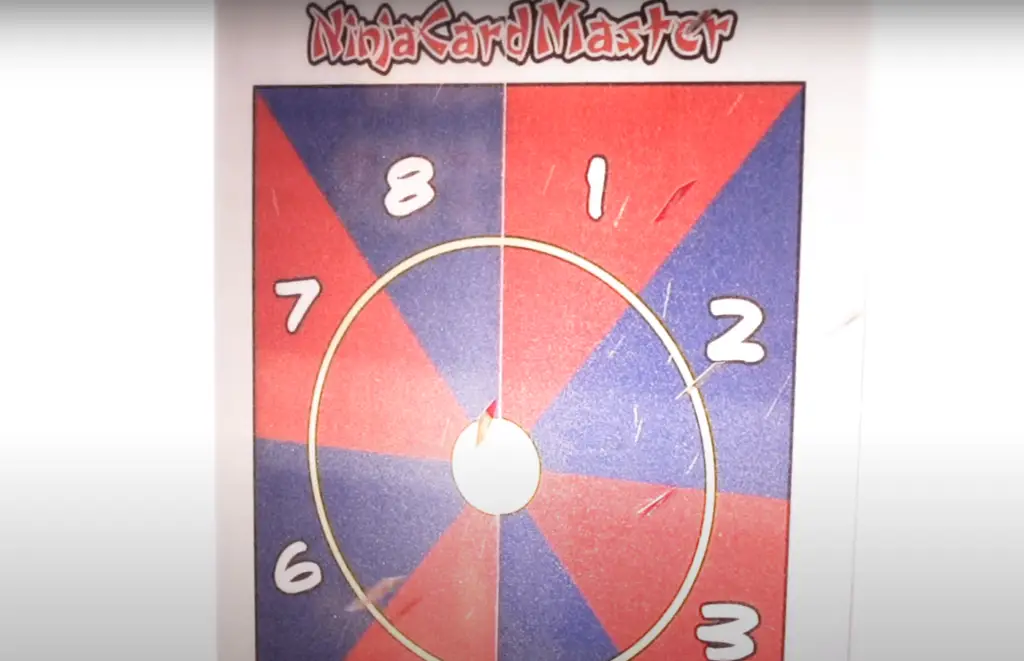
Card-Based Exercise Systems:
- Pros: Similar to Ninja Cards, there are card-based exercise systems that incorporate gamification into fitness routines. These cards may include a variety of exercises for overall fitness and conditioning. Users can create diverse workout routines using the cards
- Cons: These systems may not specifically focus on martial arts techniques. While they offer a fun and interactive approach to fitness, they might lack the specialized instruction for self-defense moves and martial arts forms;
Interactive Training Platforms:
- Pros: Some platforms combine technology with interactive training, utilizing sensors or virtual reality to simulate sparring and training scenarios. These platforms aim to provide a more immersive and engaging training experience;
- Cons: Availability and affordability of such platforms can be limiting. The technology may not be accessible to all users, and the learning curve for setup and usage might be a factor;
FAQ:
- Are Ninja Cards still in business?
As of 2023, Ninja Cards is still in operation. The innovative card-throwing game, introduced by Ken Haton and Dustin Berk, has continued its journey beyond the Shark Tank.
- Are Ninja Cards profitable?
Determining the current profitability of Ninja Cards requires access to the company’s financial data, which may not be publicly available. The success of the product is influenced by various factors such as market demand, marketing strategies, and the ability to adapt to industry trends.
- How long has Ninja Cards been in business?
Ninja Cards entered the market following its appearance on Shark Tank. The exact duration of its presence in the business landscape would depend on the timing of its introduction to the market and subsequent developments in its entrepreneurial journey.
- What are the benefits of Ninja Cards?
Ninja Cards offer a range of benefits, including:
- Ninja-Themed Entertainment: A unique fusion of traditional martial arts imagery and modern gaming elements;
- Versatile Training Tool: Suitable for beginners and experienced practitioners, offering instructional videos and a progressive learning structure;
- Engaging Learning Experience: Interactive instructional videos accessible through QR codes enhance engagement and motivation;
- Compact and Portable: The compact design allows for easy portability, enabling users to practice anytime, anywhere;
- Is Ninja Cards a well-known company?
Ninja Cards gained visibility through its appearance on Shark Tank, a platform renowned for catapulting innovative products into the public eye. While it may not have achieved widespread recognition comparable to established brands, its unique concept likely contributed to its visibility among martial arts and game enthusiasts.
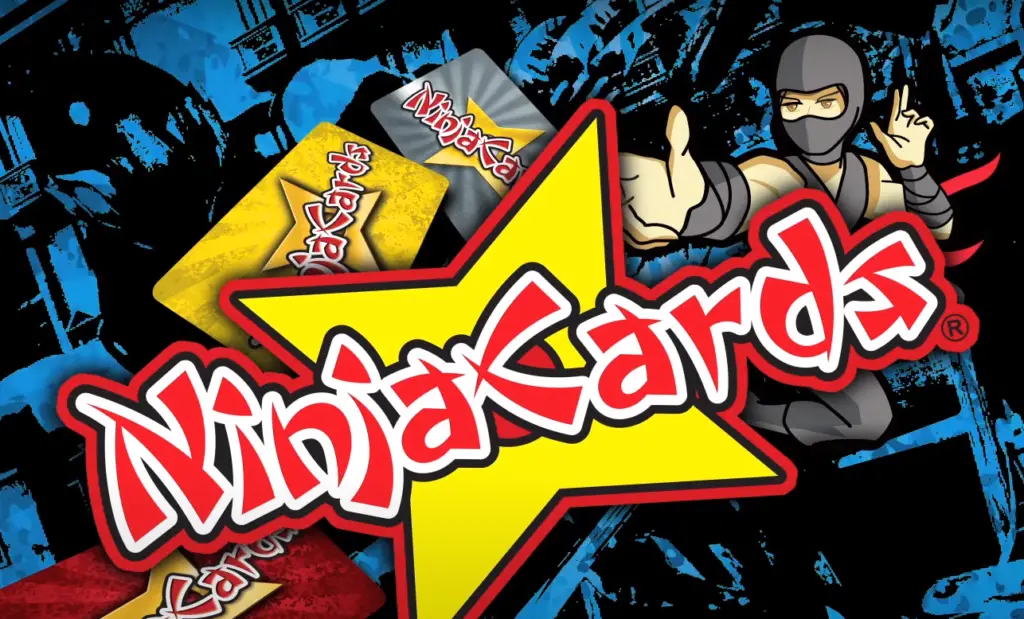
- Is Ninja Cards on social media?
For the most current updates and engagement with the Ninja Cards community, it is recommended to check their social media profiles. Platforms such as Instagram, Facebook, and Twitter are commonly used by businesses to share content, interact with users, and build a brand presence.
- Where can you buy Ninja Cards?
Ninja Cards may be purchased through various channels, including:
- Official Website: Explore different versions, accessories, and related offerings directly on the official Ninja Cards website;
- Online Marketplaces: Platforms such as Amazon may stock Ninja Cards for purchase;
- Brick-and-Mortar Retailers: Check with specialty retailers for the availability of Ninja Cards in physical stores;
Useful Video: Ninja Cards as Seen on Shark Tank
References:
- https://www.ninjacards.com/about
- https://bizzbucket.co/ninja-cards-after-shark-tank-update/
- https://www.sharktankblog.com/business/ninja-cards/
- https://startupreneurship.com/what-happened-to-ninja-cards-after-the-shark-tank-pitch/
- https://gazettereview.com/2016/10/ninja-cards-update-happened-shark-tank/
- https://2paragraphs.com/2018/09/ninja-cards-what-happened-to-card-throwing-dart-game-after-shark-tank/
- https://kirktaylor.com/ninja-cards-tortured-shark-tank-selling-online-today/
- https://www.sharktanksuccess.com/ninja-throwing-cards/














Leave a Reply